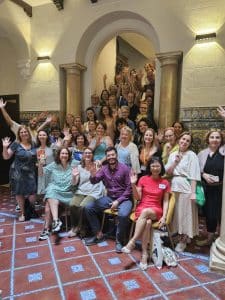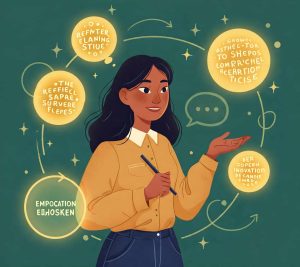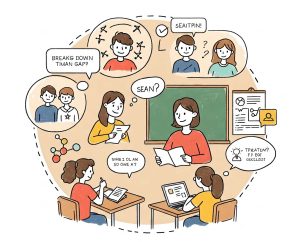- Shifting Focus from “Teaching” to “Learning”:
- Conventional model: The classroom dynamics and communication often centre on the teacher as the primary source of knowledge, with a focus on grammar rules, vocabulary lists, and a more rigid curricula.
- Present-day and future needs: Modern learners, in the digital age, have access to a wealth of information, therefore they need someone who can help them filter that information, and create a personalised learning experience that is specific to them.
- Beyond Linguistic Competence:
- Conventional model: Often solely aims to improve linguistic competence.
- Present-day and future needs: While linguistic competence is important, learners need more: they need to develop communication skills, confidence, cultural sensitivity, and real-world practical application of their skills. This requires the ability to integrate new knowledge and skills, to meet the demands of today’s global environment.
- The Need for Personalisation:
- Conventional model: Treats learners as a homogenous group, which does not take into consideration their different learning preferences, their prior experiences, or their needs.
- Present-day and future needs: Learners have diverse goals, needs, and approaches to learning. There is a clear need for differentiated, tailored, and personalised learning journeys and experiences responsive to their specific needs.
- Motivation and Engagement:
- Conventional model: Relies on extrinsic motivation (e.g., grades, tests) and prescribed learning materials.
- Present-day and future needs: Learners need intrinsic motivation, a clear sense of purpose, and to be personally involved in the learning process.
- Development of Self-Directed Learners:
- Conventional model: Often creates passive learners dependent on the teacher for direction and feedback.
- Present-day and future needs: The need to develop learners’ agency, skills of planning and reflection, self-awareness and the ability to take responsibility for their own learning.
- The Importance of the Teacher-Student Relationship:
- Conventional model: Focuses on knowledge transfer, and does not create a collaborative environment, where open communication is key.
- Present-day and future needs: To create a relationship based on trust, respect and empathy, in order to create a safe and effective learning environment. This in turn will increase teacher and learner wellbeing.
The mindset, the skills, tools and techniques to make his change happen is what ILCA is all about.
What Evidence Supports the Need for Coaching?
The evidence for the effectiveness of a coaching approach in language learning comes from multiple sources.
1.Positive Psychology Research:
Studies in positive psychology consistently highlight the benefits of focusing on strengths, fostering a growth mindset, and promoting well-being. These principles are directly applicable to a coaching model.
2. Educational Psychology and Andragogy:
Theories of adult learning emphasise the need for self-direction, autonomy, and relevant experiences, all of which are core to a coaching framework.
3. Coaching Research & Practice:
Studies on coaching effectiveness in various fields show how powerful it is, when people are given agency and are supported on their individual journeys.
4. Language Acquisition Studies:
Research in language acquisition shows the importance of authentic communication, meaningful practice, and positive effects on the learning process.
5. Professional Competencies:
Many professional associations highlight the need for strong communication skills, active listening, and a non-judgmental approach in educators.
6. Feedback from Educators:
Many educators, who have embraced a coaching approach, have highlighted the value of this methodology, and the positive changes it brings to the learning environment.
7. Increased Learner Satisfaction and Engagement:
Studies and data on learning outcomes have shown that learners are more satisfied and engaged when they feel empowered, are in control of their learning and are supported as individuals.
What Supports Coaching in Language Teaching?
1.Positive Psychology Research:
- research on motivation, self-efficacy, positive emotions, impact on learning outcomes, stress management and coping mechanisms, resilience and adaptability, mindfulness and well-being practices and positive teacher-student relationships
2. Educational Psychology and Andragogy:
- research on self-directed learning, adult learning theories, personalised education, the impact of positive learning environments, research on trauma-informed practice and social and emotional learning (SEL)
3.Coaching Research & Practice:
-
-
- research on goal setting, feedback processes, communication styles, behavioural change and self-care and wellbeing
-
4. Language Acquisition Studies:
-
-
- research on communicative language teaching, language anxiety, motivation and learner autonomy
-
5. Professional Competencies:
-
-
- professional guidelines on the teaching profession, professional standards in education, ethical coaching and practice and codes of practice on teacher wellbeing and safety
-
6. Feedback from Educators:
-
-
- testimonials of educators who have used coaching skills, teacher and student wellbeing and the impact of coaching approach on job satisfaction
-
7.Increased Learner Satisfaction and Engagement:
-
-
- research on learner autonomy & agency, engagement, retention in language learning and how active learning affects student satisfaction
-
8. Coaching Outdoors / Benefits of Nature on Learning
- Nature & Learning: impact on cognitive function, focus, memory
- Nature & Well-being: stress reduction, emotional regulation, mood elevation
- Outdoor Creativity: problem-solving, critical thinking, innovation
- Experiential Practice: effective outdoor workshops and activities
- Nature & Self-Discovery: exploration of potential, and relationship with inner self.
- Physical Activity: impact of movement on learning, wellbeing and physical awareness.
- Sensory Input: use of multiple senses to deepen the learning experience.
The evidence points towards a clear need for a more student-centred, tailored, and empowering approach to language teaching. The conventional methods that place the teacher as the primary source of knowledge will no longer fit, and do not support the modern learner’s needs.
The coaching approach, with its emphasis on self-awareness, goal setting, and individualised learning is not just a helpful addition, but is increasingly essential for teachers to empower their students and help them thrive in a fast-changing world. Not to mention the benefits of a growing need for wellbeing in classes and beyond.
At ILCA, we strive to support your learning as an educator to not only add fun activities but transform your approach to the work you do and make sure your time and energy spent on professional development will set you apart from those think CPD doesn’t make a difference.
Author: Gabriella Kovács, PCC (ILCA Co-founder)






